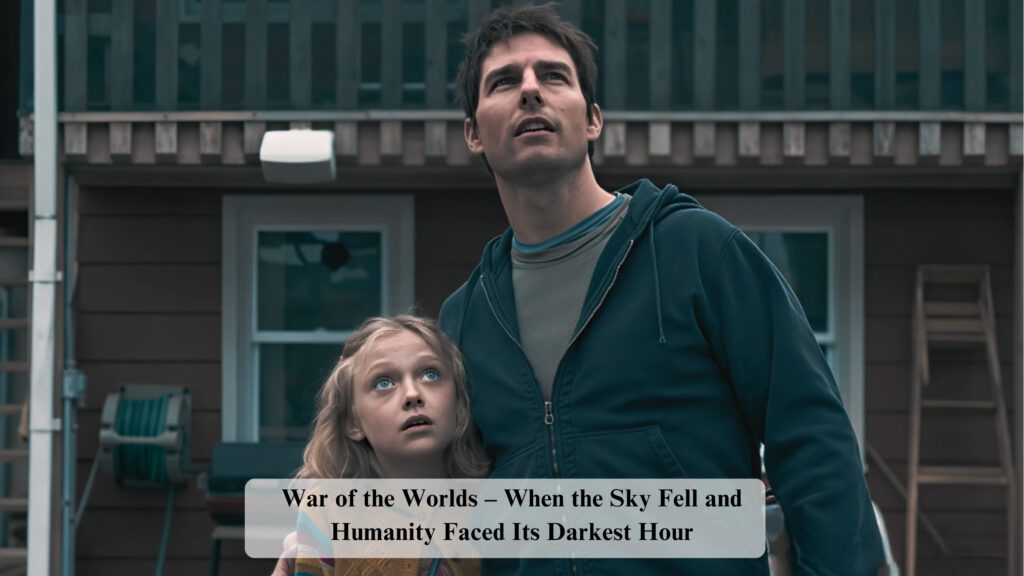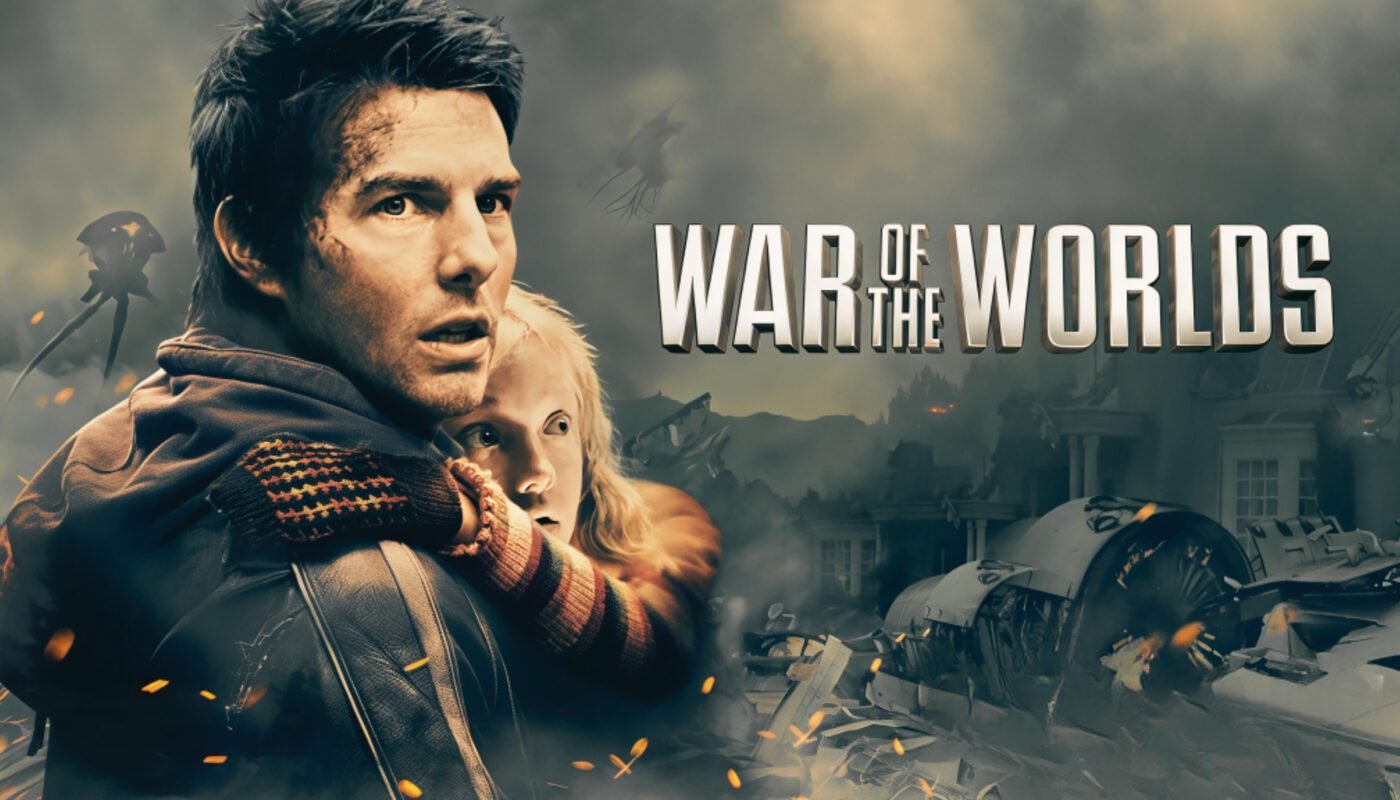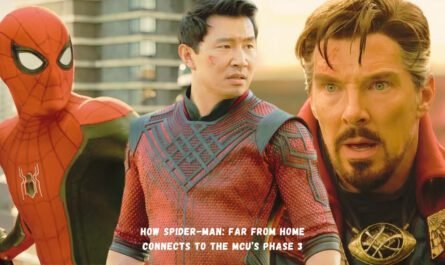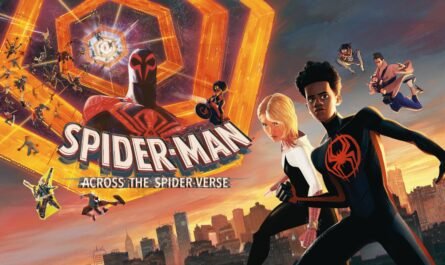The War of the Worlds begins not with thunderous explosions or blaring sirens, but with something far more unsettling—silence. A heavy, unnatural stillness blanketed the sky. The sun still shone, the streets bustled with life, and yet, somewhere in the invisible expanse above, the first threads of a terrifying plan were weaving themselves into the fabric of Earth’s reality.
Ray Ferrier, an ordinary man in an ordinary neighborhood, couldn’t have known that history was about to pivot on a single, quiet day. The hum of everyday life—children playing in the street, engines roaring in the distance—was like the calm before a storm that would tear apart everything humans thought they understood about their place in the universe.
It started with faint, almost imperceptible changes in the atmosphere. Clouds gathered without wind. Airplanes vanished from the skyline. Birds flew erratically, as if chased by an unseen predator. To most, it was just weather; to the few who noticed, it was a warning. No one yet realized that the first signs of the alien invasion had already begun.
Nature always seems to sense catastrophe before humans do. Dogs barked at the sky. Cats hid under cars. Even insects seemed to retreat into the shadows. Somewhere beyond the blue dome of Earth’s sky, the tripods—the alien machines of unimaginable size and power—waited like patient predators, hidden until the perfect moment to strike.
The first real sign was not in sight but in sound. It wasn’t thunder, though it rumbled through the ground like a living thing. It wasn’t machinery, though it had a metallic undertone that hinted of something forged beyond human skill. This sound would return later—louder, closer, and lethal. But in this moment, it was merely the whisper of war.
War of the Worlds – Ray Ferrier’s Ordinary Day Before the Extraordinary Attack

Before War of the Worlds turned Ray Ferrier’s life into a desperate fight for survival, his world was defined by the mundane. He was a divorced father, a dockworker in New Jersey, living in a modest house that echoed with the absence of family warmth. His weekends with his children were awkward, a clumsy dance between trying to be the fun dad and not knowing how to bridge the emotional distance between them.
On this particular day, Ray was more concerned with his shift at the shipping yard than with anything that might be falling from the heavens. His daughter Rachel, precise and cautious, spent most of her time reading and correcting him when he got things wrong. His teenage son Robbie, simmering with quiet resentment, had his eyes set on everything but his father.
It was just another day. Coffee in hand, tools in the truck, a vague plan for dinner that would likely end in takeout. The ordinary cocooned Ray, protecting him from the reality that, beyond his view, forces of inconceivable power were already in motion.
That’s the cruel beauty of catastrophe—it doesn’t give you a warning that says, “Today, your life will change forever.” It just arrives. And on that day, Ray was a man distracted by the small irritations of life, unaware that they were about to be replaced by terrors he couldn’t have imagined even in his nightmares.
By evening, as he returned home, dark clouds gathered over the horizon. But storms were nothing new. What was new was the strange static in the air, the way the wind carried an electrical taste, and how people instinctively began looking up at the sky with suspicion.
War of the Worlds – The Arrival of the Tripods: Earth’s First Glimpse of Terror
The moment the War of the Worlds truly began was not marked by the landing of a spaceship but by the awakening of something buried. People had gathered in the streets to watch a bizarre lightning storm unlike anything they’d seen before—bolts of light striking the same spot repeatedly, as if nature itself had chosen a target.
Then the ground trembled. Buildings rattled, glass windows shivered in their frames. What people thought was an earthquake was actually the sound of something emerging. A massive piece of the earth split apart, and with a metallic groan that seemed to claw at the soul, the first tripod rose into view.
It wasn’t just big—it was impossible. Towering above skyscrapers, its legs moved with a terrifying elegance, each step shaking the ground like the footsteps of a god. Its body shimmered with alien metal, covered in strange grooves and markings that no human engineer could decipher. And then it screamed—a sound like a deep, resonant horn that seemed to pierce every bone in the body.
The crowd didn’t know whether to run or stare. The hesitation cost lives. Without warning, the tripod fired its heat ray, a weapon that turned human beings into dust in seconds. Cars melted into twisted lumps of metal. Streets became rivers of fire. Panic erupted, but escape routes were already clogged with abandoned vehicles and debris.
Ray Ferrier didn’t have time to think. He grabbed Rachel and Robbie, forcing them into a stolen car, the only thing between them and certain death. As they sped away, he caught a final glimpse in the rearview mirror: the towering tripod, stepping over burning buildings, turning its gaze toward the fleeing masses.
War of the Worlds – Lightning Strikes Twice: The Mysterious Storm That Changed Everything
The War of the Worlds’ alien invasion wasn’t random—it was surgical. That lightning storm wasn’t a freak act of nature; it was the transport system of the invaders, a terrifyingly precise method of inserting their pilots into machines that had been buried under Earth’s surface for centuries, waiting for the right moment.
Lightning struck in the same place again and again because it wasn’t lightning—it was an energy beam, a kind of teleportation device that brought the aliens from orbit into the cockpits of their massive war machines. In hindsight, it was the moment the war truly began, even before the first shot was fired.
The storm was different from anything Earth’s weather had produced. There was no rain at first, only a churning, bruise-colored sky, lit from within by blinding streaks of energy. Thunder boomed like the drumbeat of war. People recorded it on their phones, laughing nervously, unaware they were filming the beginning of humanity’s greatest fight for survival.
When the rain finally came, it was heavy, acidic, carrying a strange metallic smell that coated skin and clothing. It soaked the streets, making the coming destruction all the more chaotic. Lightning continued to strike with mechanical precision, and each impact seemed to whisper: We are here.
Ray’s mind reeled. He didn’t understand what he was seeing, but he knew one thing—staying still meant dying. Every instinct told him to run, but the storm seemed to follow, as if the sky itself had chosen him as prey.
Continue your journey through the world of cinema with our other movie blogs — start here…




